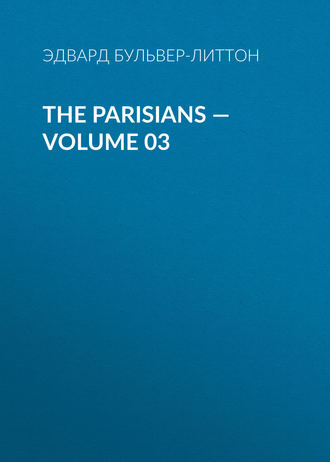
Эдвард Бульвер-Литтон
The Parisians — Volume 03
"Ah! you are too young to have known Victor de Mauleon during his short reign at Paris, as roi des viveurs."
"Yes, he was before my time; but I have heard of him as a young man of great fashion; said to be very clever, a duellist, and a sort of Don Juan."
"Exactly."
"And then I remember vaguely to have heard that he committed, or was said to have committed, some villanous action connected with a great lady's jewels, and to have left Paris in consequence."
"Ah, yes; a sad scrape. At that time there was a political crisis; we were under a Republic; anything against a noble was believed. But I am sure Victor de Mauleon was not the man to commit a larceny. However, it is quite true that he left Paris, and I don't know what has become of him since." Here he touched De Breze, who, though still near, had not been listening to this conversation, but interchanging jest and laughter with Lemercier on the motley scene of the dance.
"De Breze, have you ever heard what became of poor dear Victor de Mauleon?—you knew him."
"Knew him? I should think so. Who could be in the great world and not know le beau Victor? No; after he vanished I never heard more of him; doubtless long since dead. A good-hearted fellow in spite of all his sins."
"My dear Monsieur de Breze, did you know his half-sister?" asked Graham, —"a Madame Duval?"
"No. I never heard he had a half-sister. Halt there; I recollect that I met Victor once, in the garden at Versailles, walking arm-in-arm with the most beautiful girl I ever saw; and when I complimented him afterwards at the Jockey Club on his new conquest, he replied very gravely that the young lady was his niece. 'Niece!' said I; 'why, there can't be more than five or six years between you.' 'About that, I suppose,' said he; 'my half-sister, her mother, was more than twenty years older than I at the time of my birth.' I doubted the truth of his story at the time; but since you say he really had a sister, my doubt wronged him."
"Have you never seen that same young lady since?"
"Never."
"How many years ago was this?"
"Let me see, about twenty or twenty-one years ago. How time flies!"
Graham still continued to question, but could learn no further particulars. He turned to quit the gardens just as the band was striking up for a fresh dance, a wild German waltz air; and mingled with that German music his ear caught the sprightly sounds of the French laugh, one laugh distinguished from the rest by a more genuine ring of light-hearted joy, the laugh that he had heard on entering the gardens, and the sound of which had then saddened him. Looking towards the quarter from which it came, he again saw the "Ondine of Paris." She was not now the centre of a group. She had just found Gustave Rameau, and was clinging to his arm with a look of happiness in her face, frank and innocent as a child's; and so they passed amid the dancers down a solitary lamplit alley, till lost to the Englishman's lingering gaze.
CHAPTER X
The next morning Graham sent again for M. Renard. "Well," he cried, when that dignitary appeared and took a seat beside him, "chance has favoured me."
"I always counted on chance, Monsieur. Chance has more wit in its little finger than the Paris police in its whole body."
"I have ascertained the relations, on the mother's side, of Louise Duval, and the only question is how to get at them." Here Graham related what he had heard, and ended by saying, "This Victor de Mauleon is therefore my Louise Duval's uncle. He was, no doubt, taking charge of her in the year that the persons interested in her discovery lost sight of her in Paris; and surely he must know what became of her afterwards."
"Very probably; and chance may befriend us yet in the discovery of Victor de Mauleon. You seem not to know the particulars of that story about the jewels which brought him into some connection with the police, and resulted in his disappearance from Paris."
"No; tell me the particulars."
"Victor de Mauleon was heir to some 60,000 or 70,000 francs a year, chiefly on the mother's side; for his father, though the representative of one of the most ancient houses in Normandy, was very poor, having little of his own except the emoluments of an appointment in the Court of Louis Philippe.
"But before, by the death of his parents, Victor came into that inheritance, he very largely forestalled it. His tastes were magnificent. He took to 'sport,' kept a famous stud, was a great favourite with the English, and spoke their language fluently. Indeed he was considered very accomplished, and of considerable intellectual powers. It was generally said that some day or other, when he had sown his wild oats, he would, if he took to politics, be an eminent man. Altogether he was a very strong creature. That was a very strong age under Louis Philippe. The viveurs of Paris were fine types for the heroes of Dumas and Sue,—full of animal life and spirits. Victor de Mauleon was a romance of Dumas, incarnated."
"Monsieur Renard, forgive me that I did not before do justice to your taste in polite literature."
"Monsieur, a man in my profession does not attain even to my humble eminence if he be not something else than a professional. He must study mankind wherever they are described, even in les romans. To return to Victor de Mauleon. Though he was a 'sportman,' a gambler, a Don Juan, a duel list, nothing was ever said against his honour. On the contrary, on matters of honour he was a received oracle; and even though he had fought several duels (that was the age of duels), and was reported without a superior, almost without an equal, in either weapon, the sword or the pistol, he is said never to have wantonly provoked an encounter, and to have so used his skill that he contrived never to slay, nor even gravely to wound, an antagonist.
"I remember one instance of his generosity in this respect; for it was much talked of at the time. One of your countrymen, who had never handled a fencing-foil nor fired a pistol, took offence at something M. de Mauleon had said in disparagement of the Duke of Wellington, and called him out. Victor de Mauleon accepted the challenge, discharged his pistol, not in the air—that might have been an affront—but so as to be wide of the mark, walked up to the lines to be shot at, and when missed, said, 'Excuse the susceptibility of a Frenchman loath to believe that his countryman can be beaten save by accident, and accept every apology one gentleman can make to another for having forgotten the respect due to one of the most renowned of your national heroes.' The Englishman's name was Vane. Could it have been your father?"
"Very probably; just like my father to call out any man who insulted the honour of his country, as represented by its men. I hope the two combatants became friends?"
"That I never heard; the duel was over; there my story ends."
"Pray go on."
"One day—it was in the midst of political events which would have silenced most subjects of private gossip—the beau monde was startled by the news that the Vicomte (he was then, by his father's death, Vicomte) de Mauleon had been given into the custody of the police on the charge of stealing the jewels of the Duchesse de (the wife of a distinguished foreigner). It seems that some days before this event, the Duc, wishing to make Madame his spouse an agreeable surprise, had resolved to have a diamond necklace belonging to her, and which was of setting so old-fashioned that she had not lately worn it, reset for her birthday. He therefore secretly possessed himself of the key to an iron safe in a cabinet adjoining her dressing-room (in which safe her more valuable jewels were kept), and took from it the necklace. Imagine his dismay when the jeweller in the Rue Vivienne to whom he carried it recognized the pretended diamonds as imitation paste which he himself had some days previously inserted into an empty setting brought to him by a Monsieur with whose name he was unacquainted. The Duchesse was at that time in delicate health; and as the Duc's suspicions naturally fell on the servants, especially on the femme de chambre, who was in great favour with his wife, he did not like to alarm Madame, nor through her to put the servants on their guard. He resolved, therefore, to place the matter in the hands of the famous ————, who was then the pride and ornament of the Parisian police. And the very night afterwards the Vicomte de Mauleon was caught and apprehended in the cabinet where the jewels were kept, and to which he had got access by a false key, or at least a duplicate key, found in his possession. I should observe that M. de Mauleon occupied the entresol in the same hotel in which the upper rooms were devoted to the Duc and Duchesse and their suite. As soon as this charge against the Vicomte was made known (and it was known the next morning), the extent of his debts and the utterness of his ruin (before scarcely conjectured or wholly unheeded) became public through the medium of the journals, and furnished an obvious motive for the crime of which he was accused. We Parisians, Monsieur, are subject to the most startling reactions of feeling. The men we adore one day we execrate the next. The Vicomte passed at once from the popular admiration one bestows on a hero to the popular contempt with which one regards a petty larcener. Society wondered how it had ever condescended to receive into its bosom the gambler, the duellist, the Don Juan. However, one compensation in the way of amusement he might still afford to society for the grave injuries he had done it. Society would attend his trial, witness his demeanour at the bar, and watch the expression of his face when he was sentenced to the, galleys. But, Monsieur, this wretch completed the measure of his iniquities. He was not tried at all. The Duc and Duchesse quitted Paris for Spain, and the Duc instructed his lawyer to withdraw his charge, stating his conviction of the Vicomte's complete innocence of any other offence than that which he himself had confessed."
"What did the Vicomte confess? You omitted to state that."
"The Vicomte, when apprehended, confessed that, smitten by an insane passion for the Duchesse, which she had, on his presuming to declare it, met with indignant scorn, he had taken advantage of his lodgment in the same house to admit himself into the cabinet adjoining her dressing-room by means of a key which he had procured, made from an impression of the key-hole taken in wax.
"No evidence in support of any other charge against the Vicomte was forthcoming,—nothing, in short, beyond the infraction du domicile caused by the madness of youthful love, and for which there was no prosecution. The law, therefore, could have little to say against him. But society was more rigid; and exceedingly angry to find that a man who had been so conspicuous for luxury should prove to be a pauper, insisted on believing that M. de Mauleon was guilty of the meaner, though not perhaps, in the eyes of husbands and fathers, the more heinous, of the two offences. I presume that the Vicomte felt that he had got into a dilemma from which no pistol-shot or sword-thrust could free him, for he left Paris abruptly, and has not since reappeared. The sale of his stud and effects sufficed, I believe, to pay his debts, for I will do him the justice to say that they were paid."
"But though the Vicomte de Mauleon has disappeared, he must have left relations at Paris, who would perhaps know what has become of him and of his niece."
"I doubt it. He had no very near relations. The nearest was an old celibataire of the same name, from whom he had some expectations, but who died shortly after this esclandre, and did not name the Vicomte in his will. M. Victor had numerous connections among the highest families, the Rochebriants, Chavignys, Vandemars, Passys, Beauvilliers; but they are not likely to have retained any connection with a ruined vaurien, and still less with a niece of his who was the child of a drawing-master. But now you have given me a clew, I will try to follow it up. We must find the Vicomte, and I am not without hope of doing so. Pardon me if I decline to say more at present. I would not raise false expectations; but in a week or two I will have the honour to call again upon Monsieur."
"Wait one instant. You have really a hope of discovering M. de Mauleon?"
"Yes. I cannot say more at present."
M. Renard departed. Still that hope, however faint it might prove, served to reanimate Graham; and with that hope his heart, as if a load had been lifted from its mainspring, returned instinctively to the thought of Isaura. Whatever seemed to promise an early discharge of the commission connected with the discovery of Louise Duval seemed to bring Isaura nearer to him, or at least to excuse his yearning desire to see more of her, to understand her better. Faded into thin air was the vague jealousy of Gustave Rameau which he had so unreasonably conceived; he felt as if it were impossible that the man whom the "Ondine of Paris" claimed as her lover could dare to woo or hope to win an Isaura. He even forgot the friendship with the eloquent denouncer of the marriage-bond, which a little while ago had seemed to him an unpardonable offence. He remembered only the lovely face, so innocent, yet so intelligent; only the sweet voice, which had for the first time breathed music into his own soul; only the gentle hand, whose touch had for the first time sent through his veins the thrill which distinguishes from all her sex the woman whom we love. He went forth elated and joyous, and took his way to Isaura's villa. As he went, the leaves on the trees under which he passed seemed stirred by the soft May breeze in sympathy with his own delight. Perhaps it was rather the reverse: his own silent delight sympathized with all delight in awakening Nature. The lover seeking reconciliation with the loved one from whom some trifle has unreasonably estranged him, in a cloudless day of May,—if he be not happy enough to feel a brotherhood in all things happy,—a leaf in bloom, a bird in song,—then indeed he may call himself lover, but he does not know what is love.







